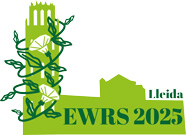Schedule
Preliminary programme
Main sessions:
1. Weed Biology and Physiology
- Dormancy and soil seed bank dynamics
- Germination ecology
- Emergence and early growth
- Weed genetics and systematics
- Weed physiology
2. Weed Ecology
- Weed community dynamics
- Species distribution, surveys, and mapping
- Interaction between fields and surrounding vegetation
- Conservation of biodiversity
- Impact of climate changes on weeds
3. Crop–Weed Interactions
- Competition – thresholds, critical periods
- Improvement of crop competition effect
- Parasitism – mechanisms and molecular basis
- Distribution and impact of parasitic weeds
- Control of parasitic weeds
- Allelopathy – basis, applications in weed management
- Modeling of crop-weed interactions
4. Precision Weed Management
- Weed sensing and maping
- Data management, GIS, algorithms
- Unmanned aircraft systems for precision weed detection and management
- Robotics in weed management
5. Herbicide Resistance
- Mechanisms of target site and non-target site resistance / HRAC update
- Resistance evolution – principles and modeling
- New cases of herbicide resistance / Resistance Criteria Update
- Resistance management tools and economics
- Anti-resistant platforms and information systems
- Omics approaches in herbicide resistance research
6. Non-chemical Weed Control Tools
- Mechanical and physical weed control
- Mulching and cover crops
- Weed management in organic farms
7. Herbicides and Application Technology
- New product concepts and development for integrated weed management
- Optimization of herbicide use
- Herbicide tolerant crops
- Improvements in formulation technology
- Adjuvants, sprayers and application techniques
8. Weed Management on Non-agricultural Land
- Weed management in non-agricultural areas
- Plant management in areas of nature conservation
- Vegetation management in non-agricultural landscapes
9. Economic and Societal Aspects of Weed Management
- Economics of weed management
- Socio-economic aspects of weed management
- Environmental aspects of weed management
- Regulatory systems and their impact on weed management
- Dissemination of knowledge and transfer of technologies
10. Invasive Weeds
- Updating control options
- Guidinace, Policy, and legislations
11. Biological Control of weeds
- Classcial biological control of alien invasive weeds
- Innundative biologcial control – mycoherbicides and invertebrates
- Mechanism in conservation biological bontrol
- Natural herbicides based on plant or fungal compounds
- Biological control in an agricultural setting
- Scope for biological control in an intergrated weed managment strategy
- Develop and broadcast biocontrol strategies resilient to climate change
- Standards and regulations on the use of biological control in Europe
- Nagoya protocol in relation to the use of biological control genetic resources
12. Agroecological weed and crop management
- Cultural practices in the core of agroecologically based systems
- Optimized combinations of non-chemical methods
- Success stories and limitations of agroecological weed and crop management
The Symposium program will have 2 concurrent sessions of oral presentations (15 min including the question period), and poster will be displayed during the whole duration of the symposium. All submissions have to be accompanied by an abstract and are subject to approval by the scientific committee. A book of abstracts of all contributions will be distributed to all registered participants. Only the abstracts of registered participants will be included in the book and in the program. The official language of the Symposium is English.
Monday - 30 June, 2025
EWRS Training for students
19.00 – 22.00 – Welcome cocktail
Tuesday - 1 July, 2025
Sessions
Working group meeting (4-5 groups)
Visit to La Seu Vella
Wednesday - 2 July, 2025
Sessions
Working group meeting (4-5 groups)
Gala Dinner
Thursday - 3 July, 2025
Sessions (half day)
Field trip
Friday - 4 July, 2025
Sessions (half day)
13.00 – 13.30 – Closing ceremony













